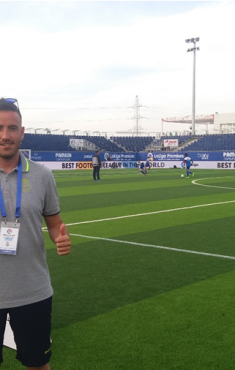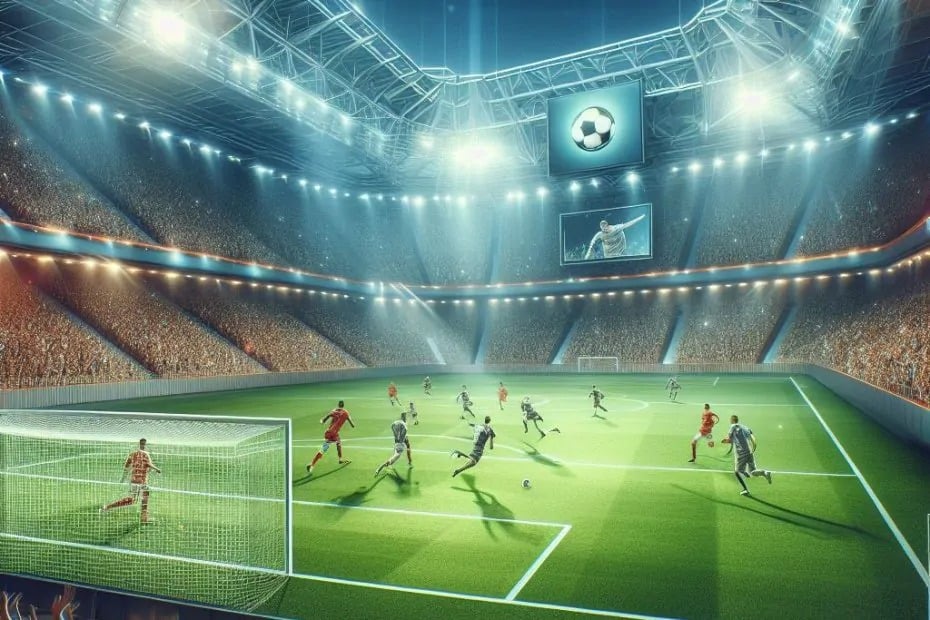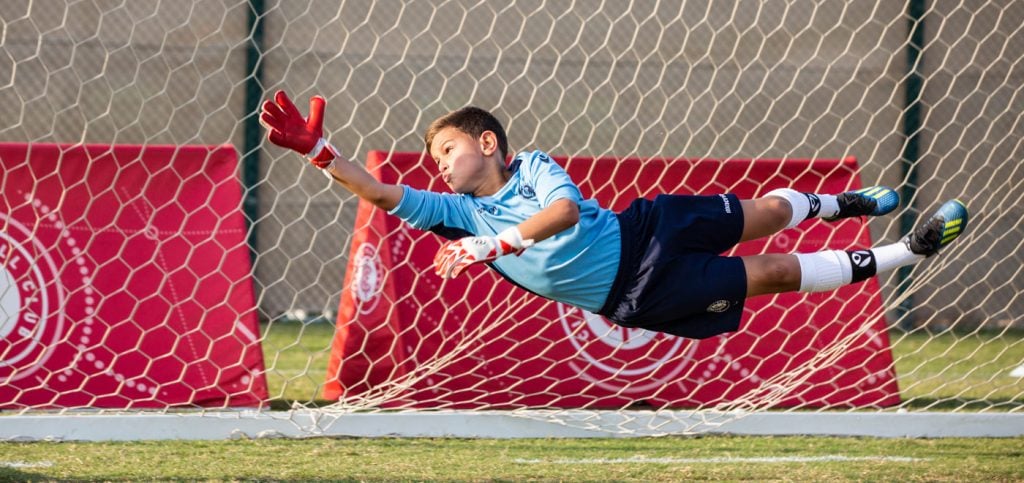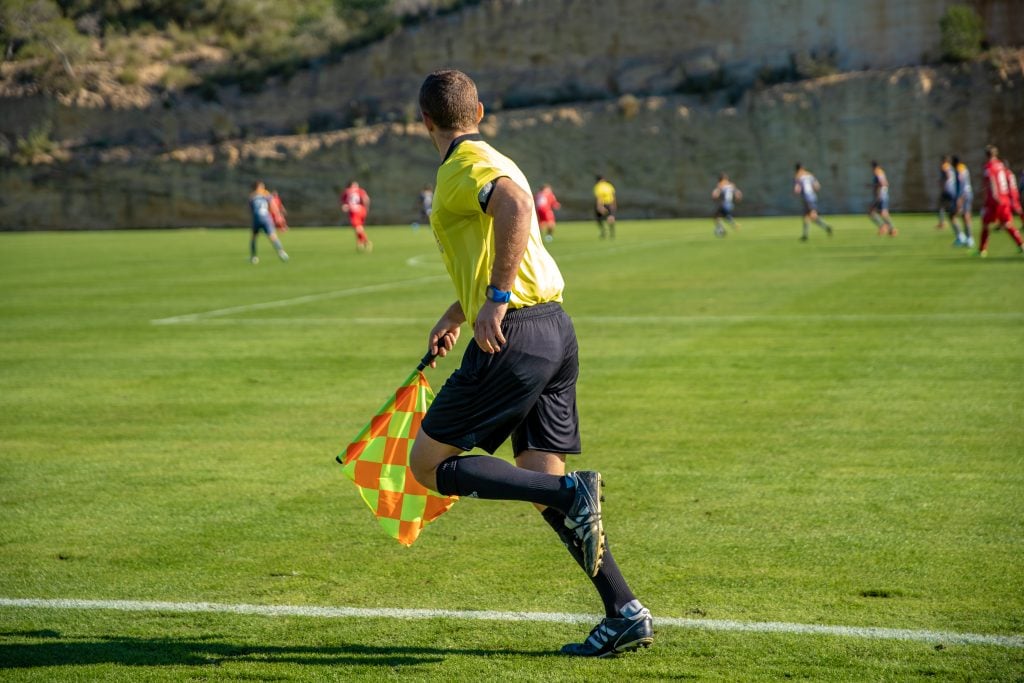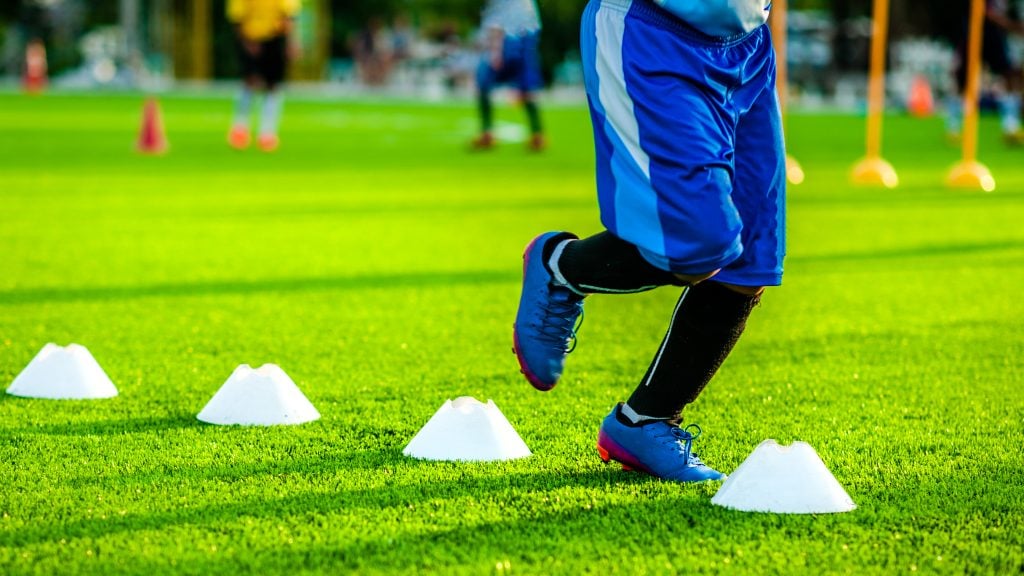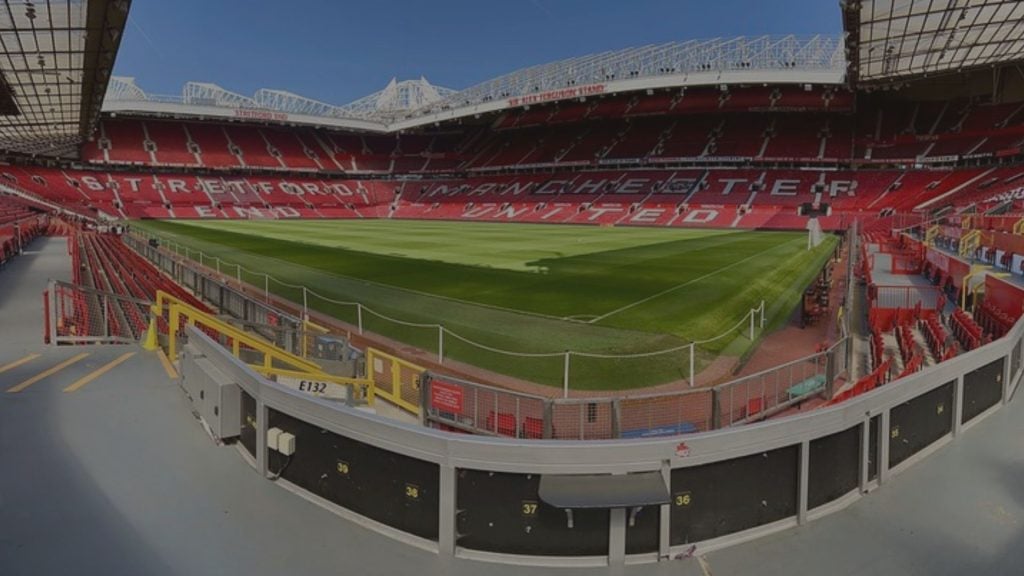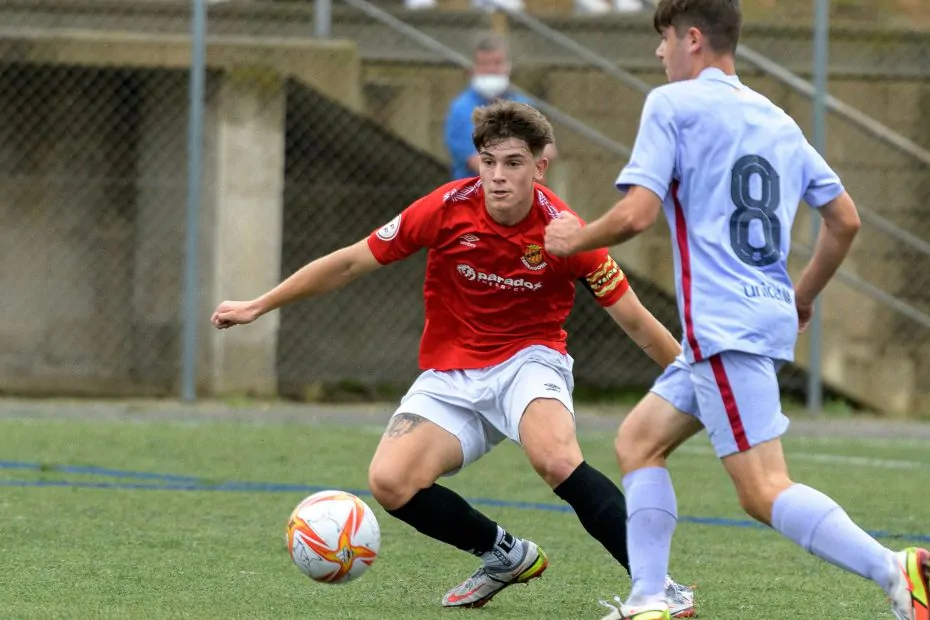As part of our never-ending quest to inspire the next generation of young football players and coaches, we often seek out the wisdom of those already making a difference to the lives of players at all ages and levels within the game. Previously we have spoken to the likes of former Barcelona player and current Kas Eupen Assistant Coach MANEL EXPOSITO, current Ottawa Fury First Team Assistant Coach JED DAVIES and Atlético de Madrid cadet coach ALBERTO RUIZ.
Each soccer coach provides a different perspective on the game and how it should be coached. But they all share common ideas that can provide inspiration to those looking to embark on a career in coaching.
What’s more, their words can give young players of all ages an insight into kind of attitude and mindsight that is required to reach a high level, and a glimpse of what day-to-day life might be like for a trainee. And perhaps most importantly, the coaches’ own personal experiences can reveal some of the challenges, obstacles and setbacks that a budding young footballer may face.
For out latest interview, we caught up with soccer coach PEDRO LOPEZ, a former player who has been coaching in Spain for the last three years.
? Hi Pedro, thanks for taking time out of your busy schedule to talk to Ertheo. Would you like to tell us a little bit about yourself?
Hi, my name is Pedro Lopez, although everyone knows me as Pery. All my life I have been linked to football in some way, first as a player and now as a coach.
I started life on the bench in 2014 as 2nd coach of the SELECCIÓN CORUÑESA FEMENINA in the Alevín (juvenile 11-12 years) and Infantile (13-14 years) categories. With the little ones we won the Galician Championship and with the older ones we reached the semi-finals.
The following year I began my studies at the School of Coaches at REAL CLUB DEPORTIVO DE LA CORUÑA. At the end of Level I, they offered me the possibility of doing an internship with the club’s Alevín team. Consequently, I had the opportunity to attend several prestigious tournaments such as the Tournament of Brunete (Liga Promises) and the Arousa Cup.
Currently I am continuing my studies in the same school and I am about to reach Level II, or the UEFA A LICENSE as it is now known.
Also, this year I was signed by SILVA SD, a well-known club in A Coruña. There I am the coach of the Infantile A team and at the same time, I am responsible for the area of ??base methodology at the football club.
? You already have a great deal of experience with young players. At what level are the players that you have trained?
I have always worked with children between 11 and 15 years at many different levels; from those starting from zero, to others with a promising future who already have a representative.
? Do you have a philosophy and what is it that inspires you to coach?
I coach because it’s been my passion since I was a kid. At school I spent hours in the classroom planning teams and player formations on paper, according to the different systems of game. Later, when I was a player, I always wondered what I would do if I were on the bench: How could this or that be improved? How could we play against a particular opponent? In short, I think that in my case, training is something vocational.
? Ok, this might be a tough question but what is it like to be trained by you? How would others describe their experience playing for you?
This is a good question for my players or for those around me, they could answer much better than me!
But those who know me know that I am a coach who is very fond of discipline, commitment and work. This is non-negotiable with me. I try to get the most out of each kid for the benefit of the group first, and for their own benefit later.
On the other hand, I consider myself a very close coach. I like to talk to the players, to listen to them. It is always important for me to know their opinions. The players’ perspective must be taken into account by the coaches, and this is something that rarely happens.
? Who was your biggest influence as a young player?
Well, I could not give you just one name. I have been fortunate to be in locker rooms with many good coaches and players. I think the interesting thing is to take the best from each one of them.
? In your opinion, what makes a great coach and what are the common factors that link them?
This is a question for the great coaches!
What is clear to me is that they all do many things well and very few things wrong. What’s more, I think that it is fundamental to surround yourself with a good working group with which you feel comfortable and can identify with. This will make it easier to achieve your objectives.
And although luck can also be important in order to become a great coach, I firmly believe in work and humility as the basis of success.
? How old were you when you started playing football seriously and at what age did your technical and tactical skills become important?
I started playing federated football in the Benjamin Category (9-10 years). At the time, there were no categories for younger children. But I started playing many years before that with my friends on the streets. It was precisely there – on the streets – that I learned almost all of my technical and tactical skills. It was a law of survival. When you faced older kids you had to find a way to beat them. This way of learning has disappeared in today’s society. The children no longer play in the street. They only practice on training days. In this way, “robot-players” are created and the natural talent of the kids is often ruined.

? Away from the streets, how many hours a week did you train when you were a youth player? And how much time would you recommend that a young player spend training today?
When I was a youth player, I trained for three hours a week, spread over 2 days. The infrastructures and the schedules did not allow for much more. Currently, this problem continues to exist in many clubs. For example, the juveniles of Silva SD still train for three hours a week, spread over 2 days. Without going too much further, there are some things that have not changed at all in the last 20 years. As for the hours recommended for training today, that will always depend on the age of the boy or girl. Planning for an Alevín is not the same as for a Cadet.
? Football training can be is hard work but it should also be great fun. What training exercise did you like most as a player? And now as a coach, what training drills or exercises do you enjoy?
For me as a player, I liked any task in which I had a ball at my feet. But above all, I liked the small game at the end of the training session. I always liked to compete so that was my favorite moment.
Now as a coach, I am clear. My sessions always include the ball as the main protagonist. I do not envisage a soccer training session in which the ball is not used. Thank God there are more and more coaches that think this way.
A few years ago, football training had a lot of physical work that was done without a ball and tasks in which the ball was used were more analytical. Today, this has changed and it now leans towards more integrated training.
I think the best way to learn to play football is precisely by playing football (reduced soccer games, mini-football etc.) This seems obvious but not everyone is clear. In my sessions, I try to take the soccer that we played in the street and bring it to the training camp. That way, the kids have fun and learn without realizing it.
? Mentality can play a big part in sport. Did your personal confidence have a direct effect on your ability as a player and how does this affect the way you teach others today?
I always say that football is a state of mind. If you have confidence in your own ability, you will train better and compete better. Sooner or later, all players have their chance and it is at that moment that they will have to show that they have faith in the work they do each day.
As a coach, I try to give my players a perspective that is different from what they have as players. In my view, it is very important to work on the emotional facet of a team, to maintain a balance. I invite them to stay grounded when things are going well and to pick themselves up when things do not go as planned.
? When you were young, were you very disciplined in terms of diet and living a healthy lifestyle?
The truth is, no! Insomuch as the diet in my house was always good and very well cooked and I did not climb on the scales too much. But I did not have a problem of being overweight. Now, I already have to measure myself more!
On the other hand, regarding the subject of a healthy lifestyle, I would like to pause a little here.
In my personal case, at the age of 15, I took a major disappointment. Together with some other colleagues, I had trials for RC Deportivo but unfortunately, I was not chosen. That was real kick in the teeth for me. Instead of continuing to train harder I let myself go and started to neglect myself. I went out partying with my friends and sometimes missed training. From this moment, my chances of making it vanished. My father warned me at the time but I did not listen to him. Over the years, I regret having taken the easy way out. I will never know what would have happened to me if I had not surrendered. But it is better not to think about it too much.
? Earlier, when talking about great coaches, you mentioned luck. How important is luck in a sports career?
I think that luck is important, but more important is knowing how to look for it. Success does not knock on anyone’s door just like that. You have to work hard and not leave everything to chance.
? On that subject, I was reading your blog earlier and noticed an article about luck (link). I think there are some good quotes in there that sum up your feelings about luck very well:
“I believe in external help in certain specific moments, but not only in football but also in any other area of ??life. But with nuances… Luck must be sought. By this I mean that luck can come (or not) if there is work behind it, but without this we can never consider ourselves truly fortunate.”
“In my opinion, it is an easy way out to say that your team has been defeated by bad luck. It is a very weak reflection, empty of content from which you can come out as a moral winner, but nothing more. If you do not dive in and search for the true causes, you will never be able to draw conclusions with criterion and, consequently, you will never be able to learn from the errors.”
? What advice would you give to an aspiring player today?
The advice I give to all young players is simple:
WORK HARD. HAVE HUMILITY. STRIVE TO IMPROVE DAY BY DAY. PERSIST WHEN THINGS DO NOT GO AS YOU WANT. SURROUND YOURSELF WITH THE RIGHT PEOPLE. CONTINUE WITH YOUR ACADEMIC TRAINING.
With all this (and with a bit of the luck we talked about earlier) you might achieve great things. And, if that’s not the case, you will never have the remorse of not having tried.
? You work with many young players and watch them develop. Do you think that football camps can play an important role in the development of young players?
Yes of course. Each year the number of camps in Spain increases and each one grows in the number of participants. That’s because they have qualified people who are doing things right.
? Finally, as I mentioned early, you enjoy writing. Would you like to tell us a bit about your latest project?
Well, now that you’re asking, I invite you all to follow my blog, which is called Al Segundo Palo.
It is a project that was launched last July and we are delighted the progress so far. In the blog, we speak about all aspects of football: current football, grass roots football, elite football, historical matches, football characters etc.
Also, from time to time we have some very interesting collaborators. It will not let you down!
You can follow Pery López on social media here:
Facebook: @AlSegundoPaloPery
Twitter: @AlSegundoPaloPL

